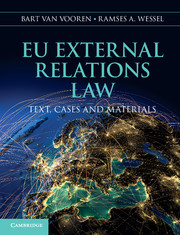Book contents
- Frontmatter
- Contents
- Table of cases
- Table of instruments and legislation
- Preface
- Acknowledgements
- List of abbreviations
- 1 The EU as a global legal actor
- 2 Instruments of EU external action
- 3 Existence of EU external competence
- 4 Nature of EU external competence
- 5 Scope and choice of EU external competence
- 6 The duty of cooperation
- 7 EU law and international law
- 8 The EU and international institutions
- 9 Common Commercial Policy
- 10 EU development policy
- 11 Common Foreign and Security Policy
- 12 Common Security and Defence Policy
- 13 The external dimension of the internal energy market
- 14 The external dimension of freedom, security and justice
- 15 The EU and its neighbours
- Index
- References
7 - EU law and international law
- Frontmatter
- Contents
- Table of cases
- Table of instruments and legislation
- Preface
- Acknowledgements
- List of abbreviations
- 1 The EU as a global legal actor
- 2 Instruments of EU external action
- 3 Existence of EU external competence
- 4 Nature of EU external competence
- 5 Scope and choice of EU external competence
- 6 The duty of cooperation
- 7 EU law and international law
- 8 The EU and international institutions
- 9 Common Commercial Policy
- 10 EU development policy
- 11 Common Foreign and Security Policy
- 12 Common Security and Defence Policy
- 13 The external dimension of the internal energy market
- 14 The external dimension of freedom, security and justice
- 15 The EU and its neighbours
- Index
- References
Summary
Central issues
The EU is usually considered a special, or sui generis, organization (see Chapter 1). This special status does not only flow from the relationship with its Member States (which indeed differentiates it from other international organizations), but also from its position towards international law. In the early days in particular, the CJEU tended to underline this special position by referring to the ‘autonomous’ legal order that was created in which the relationship between the Member States was no longer primarily regulated by international law, but by EU law. Indeed, the states were first and foremost Member States.
Yet, without international law, the EU would not exist. It is based on a treaty concluded within the framework of international treaty law. At the same time, and keeping in mind the rule of pacta tertiis nec nocent nec prosunt, third states are in principal not bound by the EU Treaty since to them it is an agreement between others. This implies that in its external legal relations the EU will have to act under international law and will also have to respect its basic rules. Within the EU legal order, however, this may lead to conflicting norms, and over the years the Court has had quite a task in finding solutions for these conflicts.
This leads to a number of questions that will be addressed in this chapter: what is the hierarchical position of international law within the EU legal order? What are the effects of international law (both written and unwritten) in the EU legal order? How did the ECJ solve conflicts between EU law and international law?
…
- Type
- Chapter
- Information
- EU External Relations LawText, Cases and Materials, pp. 208 - 245Publisher: Cambridge University PressPrint publication year: 2014
References
- 1
- Cited by

